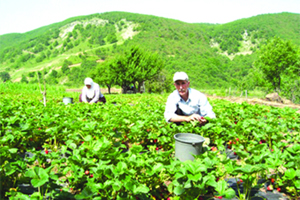The deterioration of the ecological balance and the irreparable destruction of nature have taken a serious danger for every country today. The use of chemical fertilizers in agricultural production, the unconscious and unbalanced use of pesticides has become an important threat to the health of human beings and other living things as well as the environmental conditions. Here organic farming The concept is presented as an alternative method to prevent these threats and dangers.
The expressions of ecological agriculture, biological agriculture or organic farming all go to the same door and the European Union has issued 2092 / 91 European Union Organic Agriculture RegulationAll three forms of expression were also used.
Actually in the world organic agricultural production activities started in 1930. On the one hand, the negative developments in human, environment and plant health, on the other hand, the problem of production surplus, which emerged especially in developed countries, pushed people towards new quests and caused organic agriculture to spread all over the world. As the surplus of traditional agricultural products in the European Union countries was formed, the search for agricultural production was started in order to eliminate this surplus, and this spreaded organic agriculture.
However, the development of organic agricultural production activities has been for different reasons in developed and developing countries. In developed countries, organic agricultural production has driven domestic market demand. However, the increase in export demand for organic agricultural production in developing countries has been decisive. This means that developed countries are the target market for developing countries in organic agriculture.
At the point reached today, European Union countries are the largest in the world organic food market and direct organic farming of the world with 2092 / 91 Organic Agriculture Regulation.
In addition to this regulation in the European Union, there are many regulations concerning organic agricultural production activities within the scope of common agricultural policy and environmental policies. In terms of our country, organic agriculture activities are developing rapidly and have a great export potential. 2005 in Food, Agriculture and Rural Affairs by the Ministry Implementing Regulation on Principles and Application of Organic Agriculture It has been published. This regulation uses only the word organic for organic agricultural products. The purpose of the regulation is to determine the principles and procedures for the implementation of organic agricultural activities, the preservation of the ecological balance, the regulation, development and dissemination of organic agricultural production and marketing.
Organic farming is called the production method which is done by using natural methods in plant protection and harmful struggle and by taking control measures and production processes under control in order to produce healthy and safe agricultural products without disturbing the natural balance of the world. The products obtained in this way are also called organic products.
According to another definition, organic agriculture is a mode of production that enhances and enriches the health of the agricultural ecosystem, including the biological movement, biological transformation and biodiversity of the soil.
However, in time organic agriculture has ceased to be an alternative method and has become a philosophy of life.
As the world population increases, the need for nutrition increases. The increase in the demand for agricultural products increases the demand for consumption. In order to meet the demand, it was necessary to expand the agricultural areas or to obtain more crops from agricultural areas.
However, scientific research shows that unconscious agriculture activities threaten human, animal and plant health and cause the depletion or pollution of underground water resources, leading to deterioration of natural plant and soil structure and damage to biological diversity.
These problems began to emerge first in Northern European countries. Then, in the US, agricultural production was started without the use of synthetic drugs and fertilizers under the leadership of some producers.
Today, there are countries around the world that produce organic agricultural production on the world, most of them in Asia and Africa. Organic product certification is carried out by European certification bodies.
In the early days, organic farming activities were carried out according to the rules created by each country. In 1972 the International Federation of Organic Agriculture Movements (IFOAM) was established in Germany. After that, organic agriculture activities were started to be carried out in accordance with common rules.
European Union countries have half of the world organic food market and is also the world's largest importer. Naturally, the member countries are preferred primarily for importation. However, in case the standards determined in the regulation are provided, organic agricultural products are imported from third countries. Today, the countries that export to European Union countries without any problems are Australia, Hungary, Argentina, Israel and Switzerland.
According to 2006 data, the world is certified organic agriculture production The area size is about 32 hectares. The total number of certified farmers is 624. China and Argentina are the leaders in organic farmland. However, Australia is the first. Because organic farming is more than organic farming. The pastures used in organic livestock breeding must also provide organic farming conditions. As such, the largest lands are in Australia with 12 million hectares.
In our country, according to 2005 data, the size of the area where organic agriculture is produced is 204 thousand hectares. The total number of certified farmers is 15. Organically cultivated species of 207 species.



